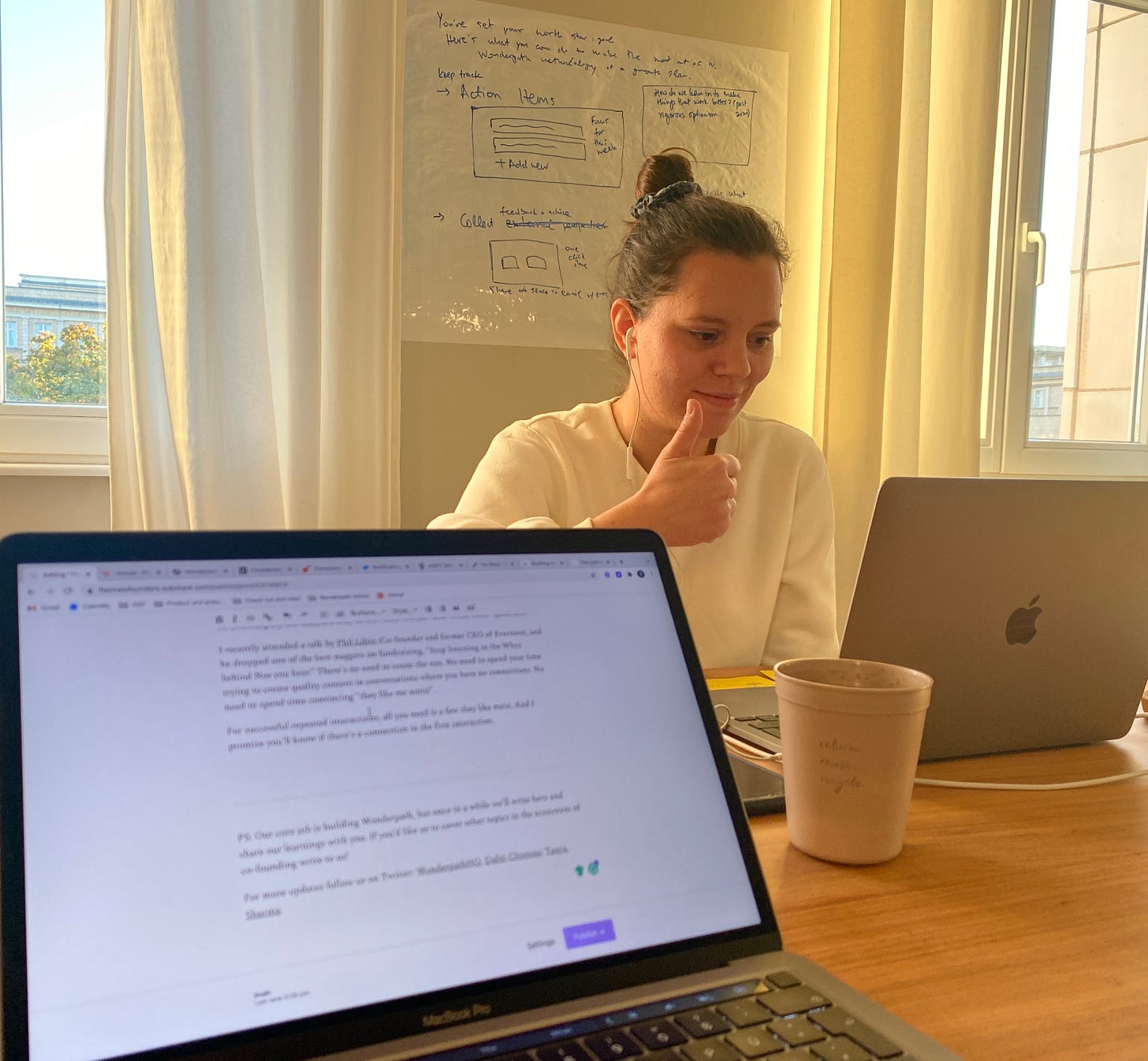If you're exploring a business idea, run multiple side gigs, or are deep into founding a business you would've heard this advice:
"Go out there and talk to as many people as you can.”
Dafni and I, since we became founders have talked to over 200 new people in the past year. That's almost 5 new people every week! We organically started to debrief on the people we met during the day at our kitchen table with coffee or while making dinner. Most of our kitchen table debriefs for sure cannot be called strategic discussions. They are usually answers to questions like these: Did I enjoy the conversation with this person? Did I like them enough to talk to them again? Do they like me enough to answer my emails? Can I connect them to anyone I've met before?
My main point being, most long-lasting relationships we build are less about what we discuss, but more about how people make us feel during the discussion. And so my biggest networking tip is: focus on the connection.
A great meeting is more about the connection and less about the content.
How do I decide who to talk to?
As a Founder, time is a scarce resource. You raise money to buy time, you don’t take vacation days to not lose time, and every day you wish you had a genie to help you manage time effectively (I recently discovered life-changing Vimcal for this task). And before you get on to step debrief, start with filtering what kind of people are you open to having conversations with. And what is the purpose of having those conversations? Here's my list of people I say “Yes, let's chat!" to.
Our ideal happy customer (an actual person, not a persona): How do we find them? For Wonderpath, we started with our network, since they fall in our target demographic. At the end of each conversation, we always ask, "do you know anyone else who could benefit from using Wonderpath?”. In this iterative process of speaking to more people and identifying common patterns, we built proxy criteria to identify these people. What topics do they discuss? What tools do they currently use? What social channels do they use? (Twitter, Polywork). We personalize messages and reach out to them for a 1-1 chat to learn more!
Other founders: Dafni and I are a part of various founder communities (On Deck, Transcend Network, Founderland) and actively connect with other founders to share our learnings, exchange ideas, practice pitching, and get feedback. It's extremely rewarding and comforting to connect with founders working in the same space especially with a complimentary product/ service to Wonderpath. I usually am cautious about talking to founders building direct competitors mostly because I don't want to be influenced by their roadmaps.
Friends and family: No explanation needed. Everyone needs cheerleaders.
My ex-bosses and colleagues: People I've worked with before are my best connectors. They know how I am at work and what my strengths are. They are the most trustworthy human links to future investors, customers, and collaborators. I always take the time to update them on what I'm working on and what my biggest challenges are.
Future investors: Some of the most fun and useful conversations about building Wonderpath happened when we said, “Yes, we'd love to chat. No, we're not looking for investment right now." But when you are fundraising, the process can be stressful and the Nos disheartening. I recently heard Phil Libin drop this beautiful advice, "Stop listening to the Whys behind Nos.” There's no need to count the nos. No need to spend your time trying to create quality content in conversations where you have no connections. No need to spend time convincing the "they like me not(s)".
How do I keep track of my conversations?
I have a dedicated space called Interactions in Coda, where I record the highlights of my conversation right after the call.
Who: Person's name and title. I usually add a note on how we connected.
Most memorable point: Top 3 themes we discussed. These are points I would like to explore further or feedback I collected.
Any follow-up items: All my calls have the element of what can I do for you? Keeping track of this ensures I follow through with what I promise.
I built this system thanks to my mega-organized co-founder, Dafni. I take lots of notes during calls. But I used to skip organizing my notes after calls. On reflecting, I realized that these are the biggest blockers between me and my organizing notes task:
I wanted to perfectly summarize a conversation aka every word said. Now I know that all I need are highlights of the conversation.
I wanted my team to understand my notes like they were in the call. Now I don't over-engineer sharing. I tell them if anything is important for them to know. (We have a different system to record user interviews, of course.)
I wanted my notes to have a long life. Now I understand the purpose of the notes is just for me to track follow-ups to reconnect with the person.
These are the same blockers between me and my self-help/ business books reading list challenge. The goal to read the books can't be to rewrite them in my own words but to get the general idea in the form of my top takeaways and follow-up items.
And so, are they "like me(s)", or "like me not(s)"?
First impressions matter. Going back to the kitchen table chats, Dafni and I essentially do this connection check. Did the person and I connect on a level that I'd have another conversation with them?
To oversimplify the idea, are they in the "they like me” and "I like them" quadrant?
Networking as a founder is increasing the number of, and chances of better connections you can have. I do so by approaching interactions with genuine curiosity to learn something new. By seeing meetings as a way to build a relationship and not a transactional exchange of information. And finally, by keeping it real.
So, as I "go out there and talk to as many people as I can”, all I'm seeking is that connection in our first interaction. Because that makes all the difference!

PS: Our core job is building Wonderpath, but once in a while we’ll write here and share our learnings with you. If you’d like us to cover other topics in the ecosystem of co-founding write to us!
For more updates follow us on Twitter: WonderpathHQ, Dafni Chontou; Tanya Sharma





